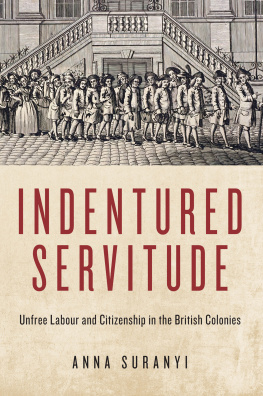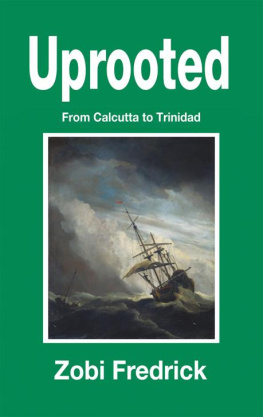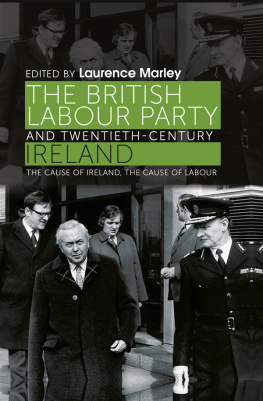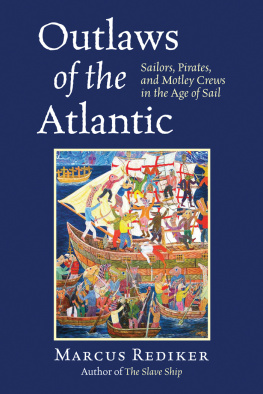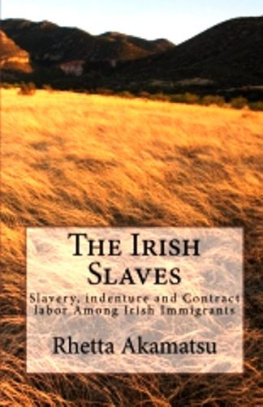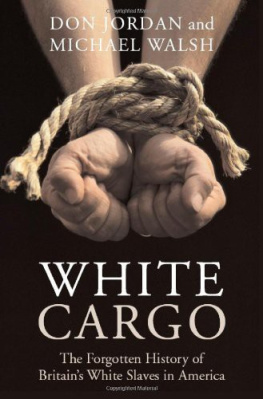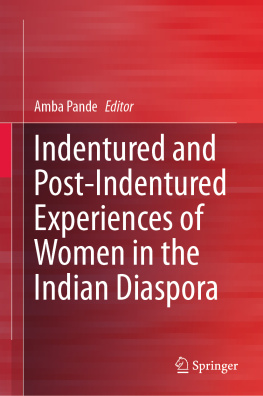INDENTURED SERVITUDE
STATES, PEOPLE, AND THE HISTORY OF SOCIAL CHANGE
Series editors: Rosalind Crone and Heather Shore
The States, People, and the History of Social Change series brings together cutting-edge books written by academic historians on criminal justice, welfare, education, health, and other areas of social change and social policy. The ways in which states, governments, and local communities have responded to social problems can be seen across many different temporal and geographical contexts. From the early modern period to contemporary times, states have attempted to shape the lives of their inhabitants in important ways. Books in this series explore how groups and individuals have negotiated the use of state power and policy to regulate, change, control, or improve peoples lives and the consequences of these processes. The series welcomes international scholars whose research explores social policy (and its earlier equivalents) as well as other responses to social need, in historical perspective.
1 Writing the Lives of the English Poor, 1750s1830s
Steven King
2 The Peoples Health
Health Intervention and Delivery in Maos China, 19491983
Zhou Xun
3 Young Subjects
Children, State-Building, and Social Reform in the Eighteenth-Century French World
Julia M. Gossard
4 Indentured Servitude
Unfree Labour and Citizenship in the British Colonies
Anna Suranyi
Indentured Servitude
Unfree Labour and Citizenship in the British Colonies
ANNA SURANYI
McGill-Queens University Press
Montreal & Kingston London Chicago
McGill-Queens University Press 2021
ISBN 978-0-2280-0667-1 (cloth)
ISBN 978-0-2280-0668-8 (paper)
ISBN 978-0-2280-0778-4 (ePDF)
ISBN 978-0-2280-0779-1 (ePUB)
Legal deposit third quarter 2021
Bibliothque nationale du Qubec
Printed in Canada on acid-free paper that is 100% ancient forest free
(100% post-consumer recycled), processed chlorine free
Library and Archives Canada Cataloguing in Publication
Title: Indentured servitude : unfree labor and citizenship in the British colonies / Anna Suranyi.
Names: Suranyi, Anna, 1967 author.
Series: States, people, and the history of social change ; 4.
Description: Series statement: States, people, and the history of social change ; 4 | Includes bibliographical references and index.
Identifiers: Canadiana (print) 20210144653 | Canadiana (ebook) 20210144807 | ISBN 9780228006688 (softcover) | ISBN 9780228006671 (hardcover) | ISBN 9780228007784 (PDF) | ISBN 9780228007791 (ePUB)
Subjects: LCSH: Indentured servantsGreat BritainHistory17th century. | LCSH: Indentured servantsGreat BritainSocial conditions17th century. | LCSH: Contract laborGreat BritainHistory17th century. | LCSH: Slave laborGreat BritainHistory17th century.
Classification: LCC HD4875.G7 S87 2021 | DDC 303.3/63094109032dc23
This book was typeset by True to Type in 10.5/13 Sabon
Contents
Figures
Notes on Spelling and Punctuation
In quoting from seventeenth- and eighteenth-century sources, I have mostly left spelling as is, except for the following changes: I have modernized capitalization and changed the anachronistic letters u, f, i, and y [the thorn] into their modern variants (as in seruant to servant, flaue to slave, ffreedome to freedome, Ione to Jone[Joan], and ye to the, while gyuen becomes gyven). For shorthand abbreviations, I have supplied the missing letters in brackets, clarifying that plt means pl[ain]t[iff] or agst means ag[ain]st. If a word can be relatively easily deciphered, I have left it as is. For instance, I have not modified the historical spelling of the suffix tion in modern English, which was usually spelled con in the seventeenth century, as in condicon or transportacon. For some idiosyncratically spelled words, I have supplied modern spellings in brackets while leaving the original in the text: roage[rogue]. Irregular spellings of first names and surnames, such as Margarett or Bradye, have remained. In some cases, I have added punctuation (mainly commas) to clarify meaning.
Preface
During the seventeenth century, hundreds of thousands of men, women, and children from Britain and Ireland journeyed across the Atlantic Ocean to populate Englands new colonies in the Caribbean and on the American mainland. Most of them, about 70 per cent, were indentured servants, who undertook their odysseys for a variety of reasons. The majority were impoverished and searching for greater opportunity and sometimes adventure overseas. A significant proportion were captives, transported by government forces because they were seen as vagrants, criminals, or rebels, and some were trafficked by spirits, professional kidnappers. Once servants arrived in the colonies, they were expected to work without wages for terms of four, seven, or more years, until receiving a payment of freedom dues at the end of their servitude. They often worked alongside enslaved labourers from Africa, who shared many of the labour conditions of the servants, but who remained captives for life. Indentured servants were frequently maltreated and exploited, but unlike enslaved people, servants possessed crucial rights of English and British subjects, not only to eventual freedom but also to certain standards of food, shelter, clothing, and care; to the final payment of freedom dues; and to defend their rights in court.
This book examines the role of indentured servitude in Britain and its colonies during the seventeenth and early eighteenth centuries, from the initial process of indenture in Britain and Ireland to the experience of living and working as an indentured servant in the North American and Caribbean colonies. In addition to establishing a population of white settlers in the British colonies, indentured servitude also shaped the way that settler communities envisioned themselves. The practice of indentured servitude was a crucial factor in shaping ideals of citizenship on both sides of the Atlantic. The condition of indentured servants in an undefined category between free English people and enslaved Africans compelled English and colonial societies to define the status of indentured servants and, by extension, the relationship of the subject to the state. By the time of the American Revolution, indentured servitude had had a significant role in shaping emerging ideals of citizenship.
In studying indentured servitude, I have examined a variety of documents, including indenture contracts; British and colonial government documents and legislation; political, moral, and economic treatises; autobiographical accounts; poetry, letters, wills, runaway ads, and other material. One of the most valuable of sources has been court cases from both Britain and the colonies, which described individuals being sentenced to servitude; servants being punished for misdeeds; servants taking their masters to court; merchants, sea captains, and government officials being penalized for illegal shipping of servants; disputes over freedom dues and indenture terms, and more. Together, these sources help to demonstrate the contemporary legal criteria defining indenture as well as the lived realities of indentured servants. They also show the resourcefulness of servants, who adapted to adverse circumstances, and strove for opportunity, agency, and better lives. Their struggle continues to resonate in our own time. We are still confronted with the fundamental problems of poverty and inequality, and there are similarities to the practices of the past in current official responses, which range from assistance and encouragement to exploitation, imprisonment, and forced labour. This book confines itself to the seventeenth and early eighteenth centuries, but readers will recognize some reflections of contemporary society.

